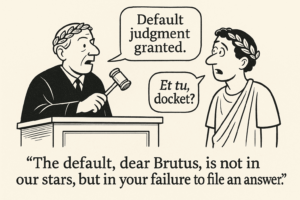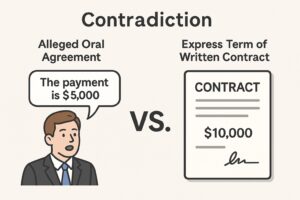 Following up on the Orca opinion’s memorable warning about “red flags” and justifiable reliance, in American Midstream v. Rainbow Energy Marketing Corp. the Texas Supreme Court held that “[t]he e courts below impermissibly blue-penciled extra words into … the contract that gave rise to this dispute …” (specifically, reading the contract as if the words “scheduled” and “physical” appeared in a key contract term about deliveries). No. 23-0384 (Tex. May 23, 2024).
Following up on the Orca opinion’s memorable warning about “red flags” and justifiable reliance, in American Midstream v. Rainbow Energy Marketing Corp. the Texas Supreme Court held that “[t]he e courts below impermissibly blue-penciled extra words into … the contract that gave rise to this dispute …” (specifically, reading the contract as if the words “scheduled” and “physical” appeared in a key contract term about deliveries). No. 23-0384 (Tex. May 23, 2024).
Monthly Archives: May 2025
In Layla’s Day Spa, Inc. v. HD Salon Group, LLC, the Fifth Court addressed the measure of damages in a business-purchase dispute involving the loss of key employees.
The trial court awarded damages based on gross revenue, using two models: one comparing average annual revenues before and after the loss of technicians, and another dividing average revenue by the number of technicians and multiplying by the number lost.
The Fifth Court reversed, emphasizing that “the calculation of lost-profit damages must be based on net profits, not on gross revenue or gross profits.” No. 05-24-00065-CV, May 21, 2025.
 “As to the October 6 answer being filed by Liang, a non-attorney, this Court has explained ‘a non-attorney’s answer on behalf of a corporation is a “curable defect” and does not make the answer ineffective. Although the answer is defective, it is sufficient to prevent the trial court from granting a no-answer default judgment against the corporate defendant.” Deal Finder LLC v. Cruz, 05-24-00311-CV (May 9, 2025).
“As to the October 6 answer being filed by Liang, a non-attorney, this Court has explained ‘a non-attorney’s answer on behalf of a corporation is a “curable defect” and does not make the answer ineffective. Although the answer is defective, it is sufficient to prevent the trial court from granting a no-answer default judgment against the corporate defendant.” Deal Finder LLC v. Cruz, 05-24-00311-CV (May 9, 2025).
“The issue in this case is whether a trial court, in ruling on a no-evidence motion for summary judgment, should consider previously filed evidence that is referenced in, but not attached to, a response to the motion. We hold that Texas Rule of Civil Procedure 166a(i) does not require attachment of previously filed summary judgment evidence and that the response at issue here sufficiently pointed out and discussed the evidence in compliance with the procedural rules.” State v. $3,774, No. 24-0258 (Tex. May 17, 2025).
 In Roxo Energy, LLC v. Baxsto, LLC, LLC, the Texas Supreme Court addressed (again) the element of justifiable reliance, in the context of alleged oral promises that contradicted written agreements.
In Roxo Energy, LLC v. Baxsto, LLC, LLC, the Texas Supreme Court addressed (again) the element of justifiable reliance, in the context of alleged oral promises that contradicted written agreements.
Specifically, the Court held that claims based on oral representations about the lessee’s intent to develop the mineral lease, rather than “flip” it, failed ecause the written lease expressly let the lessee transfer its interest with no obligation to drill or develop the land. The Court emphasized that “an unqualified contractual right to transfer a lease contradicts a prior oral promise not to do so,” making reliance on such oral promises unjustifiable.
The Court also rejected claims based on alleged misrepresentations about bonus payments. The only written commitment about bonus payments was a “most favored nations” clause, which was not breached. The Court explained that the absence of any language in the written agreements confirming the alleged oral representations about bonus amounts was itself a “red flag negating justifiable reliance””–“[T]he prudent response is to demand that the parties’ discussions be reflected in the writing—not to sign an agreement that makes no mention of the promises and then try to hold your counterparty to them anyway.”
No. 23-0564, Tex. May 9, 2025.
In Luxottica of Am., Inc. v. Gray, the Court of Appeals addressed the element of justifiable reliance in the context of fraud and related claims arising from the sale of franchise stores.
The Court held that the existence of clear contractual disclaimers and “as-is” provisions in the relevant agreements conclusively negated the element of justifiable reliance, which is required to prove claims for common-law fraud, civil conspiracy, and statutory
fraud. Specifically, the court pointed to language in the franchise and purchase agreements stating that the buyer “did not rely on any incidental statements about success made by [Luxottica], its affiliates or employees” and that the business was being conveyed “AS IS WHERE IS, WITHOUT WARRANTY EXPRESSED OR IMPLIED.” No. 05-23-00020-CV (May 5, 2025) (mem. op.). (LPHS represented the successful appellant in this case.)
I recently moderated a panel at the Fifth Circuit Judicial Conference about AI and the law, and was honored to meet two energetic thinkers in that important and rapidly developing area. You can learn more about them here:
- Judge Scott Schlegel, a Louisiana appellate, who publishes a lively and thoughtful blog about AI issues. I highly recommend keeping an eye on it.
- Professor Yonathan Arbel, of the University of Alabama Law School, who recently published a thought-provoking article in the NYU Law Review about how judges can productively use large language models when interpreting contracts.
I hope you enjoy their work and follow their thought leadership on the world-changing force of generative AI technology.
In the young days of the Republic, it was generally held that “estoppel could not be asserted against a sovereign.” Block v. North Dakota ex rel. Bd. of University and School Lands, 461 U.S. 273, 297 n.3 (1983) (O’Connor, J., dissenting).
Modern times have brought a more relaxed perspective on that principle, as summarized by the Texas Supreme Court in PDT Holdings, Inc. v. City of Dallas, No. 23-0842 (Tex. May 2, 2025):
Mistaken actions by city officials generally will not equitably estop the city from performing its governmental functions. But we have long recognized that estoppel may be necessary to prevent manifest injustice in exceptional cases where a citizen relies on affirmatively misleading government statements and suffers substantial loss as a result. …
We agree that a mere mistake in issuing a permit is not sufficient for estoppel, but that is not what happened here. Instead, city officials affirmatively told the builder that 36 feet was the applicable height limit, issued an amended permit for that height after inspecting the construction, and stated that the duplex was “OK TO FINISH” even after they identified the ordinance violation. Accordingly, we hold that legally sufficient evidence supports the disputed elements of estoppel, and the trial court did not abuse its discretion in concluding estoppel is necessary to prevent manifest injustice.
No. 23-0842 (Tex. May 2, 2025).